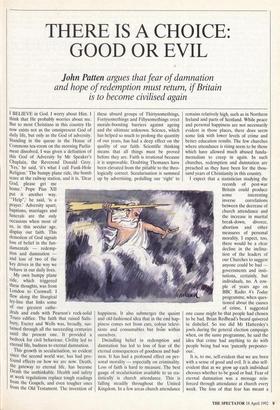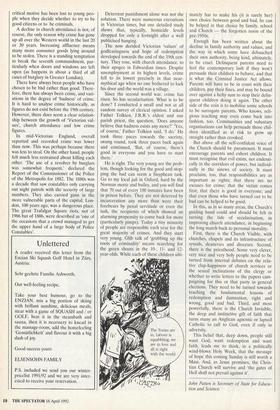THERE IS A CHOICE: GOOD OR EVIL
John Patten argues that fear of damnation and hope of redemption must return, if Britain is to become civilised again
This growth in secularisation, so evident since the second world war, has had pro- found effects on how we are now. Death, the gateway to eternal life, has become Death the unthinkable. Health and safety at work regulations replace tough readings from the Gospels, and even tougher ones from the Old Testament. The invention of these absurd groups of Thirtysomethings, Fortysomethings and Fiftysomethings erect morale-boosting barriers against ageing and the ultimate' unknown. Science, which has helped so much to prolong the quantity of our years, has had a deep effect on the quality of our faith. Scientific thinking means that all things must be proved before they are. Faith is irrational because it is unprovable. Doubting Thomases have been elevated from the pitiable to the theo- logically correct. Secularisation is summed up by advertising, pedalling our 'right' to happiness. It also submerges the quaint and old-fashioned idea that in the end hap- piness comes not from cars, colour televi- sions and consumables but from within ourselves.
Dwindling belief in redemption and damnation has led to loss of fear of the eternal consequences of goodness and bad- ness. It has had a profound effect on per- sonal morality — especially on criminality. Loss of faith is hard to measure. The best gauge of secularisation available to us sta- tistically is church attendance. This is falling steadily throughout the United Kingdom. In a few areas church attendance remains relatively high, such as in Northern Ireland and parts of Scotland. While peace and personal happiness are not necessarily evident in those places, there does seem some link with lower levels of crime and better education results. The few churches where attendance is rising seem to be those which have allowed much abused funda- mentalism to creep in again. In such churches, redemption and damnation are preached as they have been for the thou- sand years of Christianity in this country.
some interesting inverse correlations It is, to me, self-evident that we are born with a sense of good and evil. It is also self- evident that as we grow up each individual chooses whether to be good or bad. Fear of eternal damnation was a message rein- forced through attendance at church every week. The loss of that fear has meant a critical motive has been lost to young peo- ple when they decide whether to try to be good citizens or to be criminals.
A decline in church attendance is not, of course, the only reason why crime has gone up all over the Western world in the last 20 or 30 years. Increasing affluence means many more consumer goods lying around to be stolen. There is a standing temptation to break the seventh commandment, par- ticularly when doors and windows are left open (as happens in about a third of all cases of burglary in Greater London).
There have always been people who have chosen to be bbd rather than good. There- fore, there has always been crime, and vari- ations in the degree of 'badness' of crime. It is hard to analyse crime historically, as figures do not exist before the 19th century. However, there does seem a clear relation- ship between the growth of 'Victorian val- ues', church attendance and low crime figures.
In mid-Victorian England, overall reported and recorded crime was lower than now. This was perhaps because there was less to steal. On the other hand, people felt much less restrained about killing each other. 'The use of a revolver by burglars was somewhat frequent,' declared the Report of the Commissioner of the Police of the Metropolis for 1882. The 1880s was a decade that saw constables only carrying out night patrols with the security of large numbers. They also carried guns in the more vulnerable parts of the capital. Lon- don, 100 years ago, was a dangerous place. The great Trafalgar Square riots, not of 1986 but of 1886, were described as 'one of the occasions that a crowd managed to get the upper hand of a large body of Police Constables'. Deterrent punishment alone was not the solution. There were numerous executions in Victorian times, but one detailed study shows that, typically, homicide levels dropped for only a fortnight after a well publicised hanging.
The now derided Victorian 'values' of godfearingness and hope of redemption developed towards the end of the 19th cen- tury. They rose, with church attendance, to their apogee in Edwardian times. Despite unemployment at its highest levels, crime fell to its lowest precisely in that near- mythical age when no one bothered to lock his door and the world was a village.
Since the second world war, crime has risen. So has secularisation. What is to be done? I conducted a small and not at all random survey of clerical opinion. I asked Father Tolkien, J.R.R.'s eldest and our parish priest, the question, 'Does anyone believe that badness exists any more?"Yes, of course,' Father Tolkien said, 'I do.' He took three paces towards the sacristy, swung round, took three paces back again and continued, 'But, of course, there's good in everyone and you have to start there.'
He is right. The very young are the prob- lem, though looking for the good and stop- ping the bad can seem a Sisyphean task. Go to my local jail in Oxford, hard by the Norman motte and bailey, and you will find that 70 out of every 100 inmates have been in• prison before. They are not deterred by incarceration any more than were their forebears by penal servitude or even the lash, the recipients of which showed an alarming propensity to come back for more (particularly pimps). Today a tiny minority of people are responsible each year for the great majority of crimes. And they start very young. Glib talk of 'grubbing up the roots of criminality' means searching for the green shoots in the 10-, 11- and 12- year-olds. While each of these children ulti-
mately has to make his (it is rarely her) own choice between good and bad, he can be helped in that choice by family, school and Church — the forgotten norm of the pre-1950s.
Enough has been written about the decline in family authority and values, and the way in which some have debauched their own authority, being kind, ultimately, to be cruel. Delinquent parents need to feel the contemporary lash if they won't persuade their children to behave, and that is what the Criminal Justice Act allows. Parents will have to be in court with their children, pay their fines, and may be bound over against a hefty sum to stop their delin- quent children doing it again. The other side of the coin is to mobilise some schools to be surrogate parents. Who knows, reli- gious teaching may even come back into fashion, too. Communities and voluntary organisations can help persuade those chil- dren identified as at risk to grow up straight rather than crooked.
But above all the self-confident voice of the Church should be paramount. It must encourage parents and exhort children. It must recognise that evil exists, not endemi- cally in the corridors of power, but individ- ually in the sinews of society. It must proclaim, too, that responsibilities are as important as rights; that there are no excuses for crime; that the victim comes first; that there is good in everyone; and that even those who have turned out to be bad can be helped to be good.
In this, as in so many areas, the Church's guiding hand could and should be felt in turning the tide of secularisation, in improving church attendance, in beginning the long march back to personal morality.
First, there is the Church Visible, with churches, chapels and its infrastructure of synods, deaneries and dioceses. Second, there is the priesthood. Some very clever, very nice and very holy people need to be turned from internal debates on the rela- tive clap-happiness of church services or the sexual inclinations of the clergy or whether to write letters to the papers cam- paigning for this or that party in general elections. They need to be turned towards teaching the fundamental lessons of redemption and damnation, right and wrong, good and bad. Third, and most powerfully, there is the Church Invisible, the deep and instinctive gift of faith that turns many an Anglican agnostic or lapsed Catholic to call to God, even if only in adversity.
This belief that, deep down, people still want God, want redemption and want faith, leads me to think, in a politically wind-blown Holy Week, that the message of hope this coming Sunday is still worth a Mass. And, as Jesus promises, the Chris- tian Church will survive and 'the gates of Hell shall not prevail against it'.
John Patten is Secretary of State for Educa- tion and Science.



















































 Previous page
Previous page